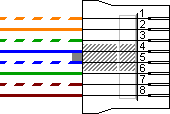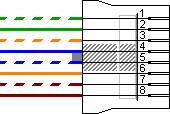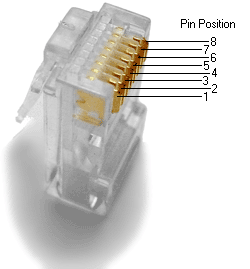Connector RJ 45 PIN Number
The straight through RJ45 network cable, EIA/TIA 568B
The most common wiring for RJ45 cables is the straight through cable. In this cable layout, all pins are wired one-to-one to the other

side. The pins on the RJ45 connector are assigned in pairs, and every pair carries one differential signal. Each line pair has to be twisted. If UTP or FTP cable is used, the pairs have orange, brown, blue and green colors. The wiring of these cables to RJ45 to make a straight through cable is defined by EIA/TIA 568B. The RJ45 connectors on both ends are wired in the same way. The color scheme is shown below.
The cross over RJ45 network cable, EIA/TIA 568A
The straight through RJ45 cable is commonly used to connect network cards with hubs on 10Base-T and 100Base-Tx networks. On network cards, pair 1–2 is the transmitter, and pair 3–6 is the receiver. The other two pairs are not used. On hubs pair 1–2 is the receiver and 3–6 the transmitter. Because of this a straight through RJ45 cable can be used to connect network cards to hubs.

In very small network configurations where only two computers have to be connected, the use of a hub is not necessary. The straight through RJ45 cable cannot be used in that situation. Also when two hubs have to be connected to increase the number of nodes on a network segment, this cable is not appropriate. In both situations a cross over RJ45 cable is necessary, where the transmit and receive lines on both RJ45 connectors are cross connected. The color coding for the cross over RJ45 cable has been defined in the EIA/TIA 568A standard.
Please note: One RJ45 connector has to be wired as EIA/TIA 568B, the other as EIA/TIA 568A. When wiring both ends as EIA/TIA 568A, the resulting cable is a straight through cable again.
